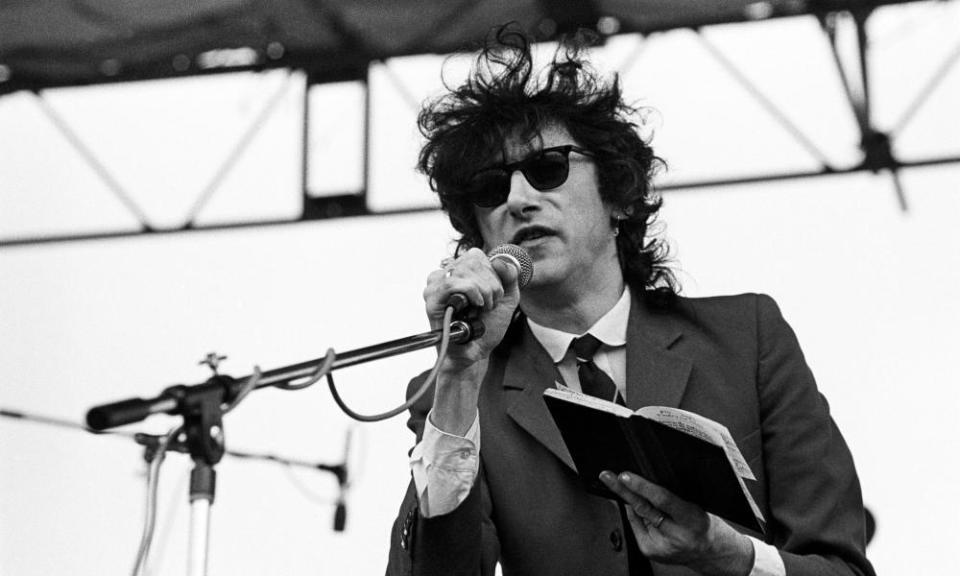I Wanna Be Yours by John Cooper Clarke review – chapter and verse

Even at the start, John Cooper Clarke never had stage fright. “They say about people in showbusiness, ‘They ain’t got something extra, they got something missing’.” In Clarke’s case, he was untroubled by self-doubt, and however low he sank, that never changed. You can hear it right through this wild ride of a memoir, in the sardonic Salford drawl that’s always ready with a quip or a comeback. Here, that voice takes a while to tune into, for it’s strange to have this dandified poet suddenly present himself in the plain clothes of prose. When he recalls his family, for instance, I couldn’t help think of his magnificently gloomy A Distant Relation: “All of our yesterday’s./ Familiar rings,/ I have to get away,/ Its breaking my heartstrings,/ We have a drink,/ On special occasions,/ It makes me think,/ About distant relations.” But the truth is in every way more prosaic. The young poet loved his mum and dad and most other members of his clan.
A nervous, malnourished youth, born in 1949, the young John survived a bout of TB to grow up in the largely Jewish neighbourhood of Higher Broughton (“Had I seen Schindler’s List? I was on Schindler’s List – Dr Schindler my dentist, that is”). When his mother went shopping, she parked him at the Rialto picture house, where a lifelong passion for movies was born. A bookish teen who hated school, where he was chastised for his “lack of team spirit”, he immersed himself in Mad magazine, comic books and pulp fiction, not to mention clothes, music, adverts, hair styles, modern art, football and showbusiness. The intricacy of detail he supplies is staggering, right down to his uncle’s “beautiful pale-blue and cream Dansette”, and you start to wonder: is he going to tell us everything? Apparently yes, because he’s forgotten absolutely nothing. This is the Lancashire lad as mohair-suited Proust, weak of lung but iron of will, plotting his course from antic poète maudit to punk laureate with all points in between.
Related: John Cooper Clarke: 'My trousers? River Island or M&S. The skinniest they do'
Be warned, however: he doesn’t actually take to the stage until page 203. Before that come screeds of reminiscence about his hungry years and his frequent changes of career. He was, inter alia, a bookie’s runner, a garage monkey, a lab technician, an apprentice cutter at a tailor’s, a trainee compositor at a printworks, a caretaker, a fire watcher at a royal naval dockyard. He was also a shoplifter and a raider of chemists to feed his burgeoning drug habit. In the meantime, he had begun writing verse, inspired by Baudelaire, the American songbook and The Mersey Sound of McGough et al. I think it certain that no other poet in the land can claim as his chief sponsors Bernard Manning and punk rock. The former – “folk devil” and owner of Manchester’s roughneck Embassy Club – perhaps recognised Clarke as an heir of the fast-vanishing music-hall tradition. Manning was the first to pay him cash for performing. He could handle the hostility and aggro of the audience. The real enemy was “indifference” – if he could hear the punters talking he knew the game was up. In the mid-70s, Clarke found himself recruited as house poet of the new wave; he befriended the Clash, toured with Elvis Costello and found soulmates in Mark E Smith, Linton Kwesi Johnson and Richard Hell (of the Voidoids). He shared rooms in a Brixton dosshouse with Nico, formerly of the Velvet Underground.
Needing money to “sort himself”, he was always available for touring, either at home or abroad, always Mr Reliable, off his tits on heroin and speed. If you don’t care for stories about craving drugs and scoring drugs, the second half of the book might pall, but as a slice of 70s nostalgie de la boue I found it pretty compelling, a companion piece to Viv Albertine’s brilliant 2014 memoir, Clothes Music Boys. About drugs, Clarke is both connoisseurial and fastidious – he has a horror of being ill, yet shooting up three times a day allows him to live “like a normal citizen”. How he got in so deep he doesn’t really know. It started as a search for a “reverie” and then became a necessity: “There’s no way you can look for the tell-tale signs, because when you get them, it’s too late.” Three times his habit nearly killed him. In Auckland, New Zealand, a nurse brings him back from the dead with a punch to the heart. As fast as he earns he loses it all on junk, including the pots of money he made fronting ad campaigns. He’s not fussy. “I’ve never advertised anything that I wouldn’t eat myself,” he says, namely Sugar Puffs, Domino’s Pizza and McCain oven chips: all the food groups.

That he survived it all seems a small miracle. He has even found domestic contentment with a wife and a daughter and following his appearance on Desert Island Discs he looks in serious danger of becoming a national treasure. He knows how lucky he’s been. Maybe the saddest story here concerns the time he was in Amsterdam with Nico, waiting for her dealer to arrive. A “skinny guy”, old and grey with greasy hair and no front teeth, eventually shows up and says, in a barely audible whisper: “Hi.” Wraps and cash are exchanged. Twenty years later, Clarke is watching the film Let’s Get Lost when he sees on screen the old guy he bought heroin from – and realises it’s Chet Baker. “I should have known it was him just from the way he said ‘Hi’”, but the Chet he loved was “the kid with the golden cheekbones, the James Dean of blue-eyed jazz”, not this wizened husk. Baker died after a mysterious fall from a window in 1988, a junkie to the last. But “thank God, thank God, thank Almighty God”, Johnny Clarke’s exit has been indefinitely postponed.
• Anthony Quinn’s Klopp: My Liverpool Romance is published by Faber next month
• I Wanna Be Yours by John Cooper Clarke is published by Picador (£20). To order a copy go to guardianbookshop.com. Delivery charges may apply


